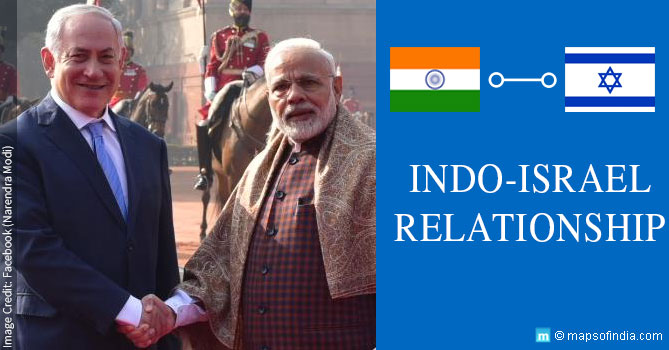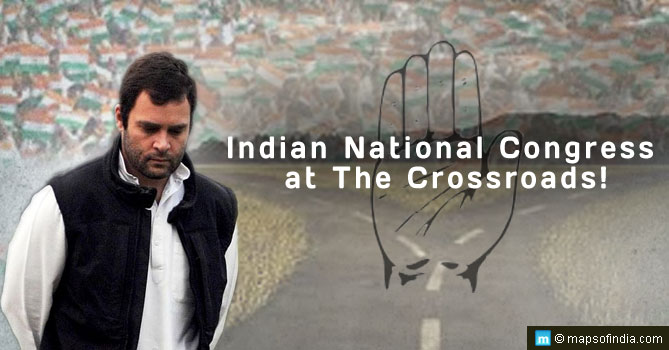On 14 May 1948, David Ben-Gurion, the head of the Jewish Agency, declared the establishment of the Jewish state known as Israel. Almost a year later, the United Nations admitted Israel as a member state following a majority vote in favour of the resolution. In 1950, a newly formed Republic of India recognized Israel, but this did not lead to the establishment of diplomatic relations between the two countries. Though India and Israel continued to maintain arms trade, it is only in 1992 that the Narasimha Rao government established diplomatic ties with Israel with the opening of the Israeli embassy in New Delhi and the Indian embassy in Tel Aviv.
In 1996, President Ezer Weizman became the first Israeli head of state to visit India. The visit marked the purchase of Barak I, a vertically launched SAM (surface to air missile). Later, in 2003, Prime Minister Ariel Sharon visited India. This marked the beginning of the development of cordial ties between the two nations. Over the past couple of decades the two countries have nurtured strong trade, defence, and cultural ties.
A Historic Visit and Broken Protocols
The arrival of Prime Minister Benjamin Netanyahu on a 6-day visit (starting 14 January) is a very significant chapter in the bilateral ties between India and Israel. The importance of the visit can be gauged from the fact that Prime Minister Narendra Modi broke protocol and received the Israeli Prime Minister and his wife Sara at the Delhi airport. He welcomed PM Netanyahu with a warm hug. Ahead of his departure from Israel PM Natanyahu had announced, “We are strengthening ties between Israel and this important global power (India). This serves our security, economic, trade and tourism interests, as well as many other areas. This is a great blessing for the State of Israel”.
“I4I”
Over the past 25 years, both Israel and India have shown keen interest in developing very strong bilateral relations. So much so, that Israel is now India’s major defence supplier. It is also India’s strategic partners in security issues and an important source of technology in various fields. “India for Israel and Israel for India” (I4I) is now one of our leading partnership programmes. Israel refers to it as the “Israel India Innovation Initiative Fund” or I4F.
Prime Minister Netanyahu’s visit is likely boost trade and diplomatic ties between the two nations. Israeli PM will is scheduled to attend a Bollywood event, ‘Shalom Bollywood’, and invite the film fraternity to produce movies in Israel’s beautiful locales. PM Modi is likely to showcase India as a manufacturing hub thereby inviting Israeli defence manufacturers to set up manufacturing unit in India. This is a great opportunity for both the nations to boost cultural exchanges and tourism opportunities. The two Prime Ministers are likely to come up with a joint programme which focuses on combating terrorism and global security threats. The Ministry of External Affairs said that the two nations would hold interactions and discuss the use of cutting edge technology in the fields of science and agriculture. It is also highly likely that India will negotiate the procurement of more state-of-the-art arms and ammunition from Israel and make up for the cancellation of a recent deal.
Despite Jerusalem
The issue of Palestine has remained a longstanding difference between India and Israel. Israeli news media has suggested that India’s voting record at the UN suggest its support for the Palestinian cause. Recently India voted in favour of the UN General Assembly resolution on Jerusalem going against the United States and Israel. Israel continues to seek US support even as its action in the occupied territories threatens peace and harmony in the region.
A major newspaper in Israel carried the headline, ‘India Wants an Affair when it Comes to Israel, not a Serious Relationship‘. Israeli media also suggests that India’s relationship with the Arab nations is far more complex than is likely to be admitted by Netanyahu’s government. India has been unwilling to take a strong stand against Iran much to the discomfort of Israel. Israel too has been unwilling to come out in support of India as the latter combats Pakistan and China on various issues related to trade, security, and diplomacy.
The MEA went on to place on record that India-Israel relations are much bigger than the Palestine issue. PM Netanyahu’s visit despite India’s vote at the UN brings glad tidings to the people of both countries. India will, however, have to delicately balance its relations with Israel and Palestine and make a dedicated effort to avoid upsetting the apple cart.





